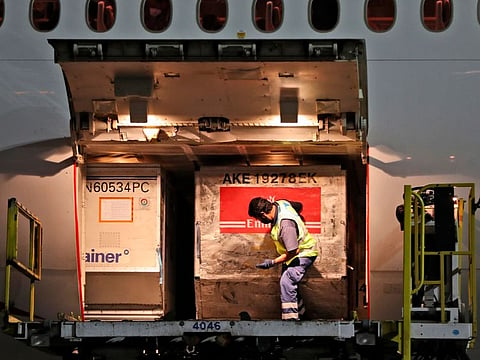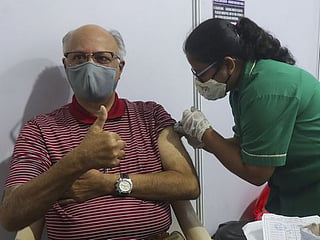What is vaccine diplomacy and how it became the latest buzzword?
UAE intends to utilise its strategic location as a hub for global vaccine distribution

The year 2021 is expected to deliver vaccinations in a large enough quantity to protect the world’s population against COVID-19.
In less than a year since the start of the COVID-19 pandemic, vaccines have been developed with the use of cutting-edge technology, approved ahead of typical schedule by regulators, shipped between countries, and distributed among nations.
For the first time in history, people watched as vaccine manufacturers rose above competition to deliver millions of doses in various countries. Big pharma firms across the globe — like Pfizer-BioNTech, Moderna, Sinopharm, Sputnik and Oxford-AstraZeneca became household names.
As countries around the globe launch nationwide vaccination campaigns to bring an end to the pandemic, we have seen various world leaders roll up their own sleeves in a bid to bolster the faith of citizens who may doubt the safety and efficacy of vaccines developed at breakneck speed.
While the pandemic caused major border lockdowns and forced countries to survive on domestic economies, it also created new avenues for strengthening international cooperation between countries through science and technology.
For example, the exchange of medical equipment, distribution of masks and personal protective equipment, and now with the vaccines’ distribution, has brought back into the spotlight a niche form called “Vaccine Diplomacy,” which had not, until now, been widely utilised on such a global scale.
“Vaccine Diplomacy” is part of Global Health, which depends on the vaccines’ manufacturing and distribution. It is a form of “soft and smart” diplomacy for the 21st century, as the country that takes the forefront in the manufacture and distribution of vaccines will hold a strong reputation as a soft power and will solidly advance its diplomatic influence.
History of vaccine diplomacy
Dr. Peter Hotez, the President of Sabin Vaccine Institute, explains the importance of vaccine diplomacy in foreign policy, “While the historical and modern-day track records of vaccine and vaccine science diplomacy are impressive, they have not yet led to an overarching framework for its expanded role in foreign policy. Establishing such a framework might be especially useful.”
The first discovery of vaccines was made in 1798 by British doctor Edward Jenner, a pioneer scientist who published his research on using the cowpox (vaccinia) virus to vaccinate against the human smallpox virus. Within 10 years, the smallpox vaccine became popularly used in both England and France.
The UAE has become a hub for vaccines in the Middle East region. It was the first country from the region to collaborate with China and Russia on the manufacture of the vaccine, participate in wide vaccine trials and now works to distribute the vaccines through Emirates Airlines worldwide

Urging leaders such as Napoleon to establish vaccine departments in all main cities within the French Empire, Edward Jenner was thereafter elected a foreign member of the Institute of France in 1811, during the time of total war between England and France. However, in a letter to the National Institute of France, Jenner wrote, “The sciences are never at war.”
Countries such as India, China, and the United States embed vaccine diplomacy into their foreign policy by consolidating scientific efforts in vaccine development and distribution to strategically increase their influence and soft power. India is implementing the “neighbourhood first policy,” sending millions of vaccines to the Maldives, Bhutan, Bangladesh, and Nepal.
China, aiming to establish global health leadership, launched the “Health Silk Road” initiative to increase its market share by promoting its vaccine among other world regions. As well as adopting “Africa First” policy, while extending support to other countries like Brazil, Morocco, Indonesia as per a report by CNN.
Joining the race in vaccine diplomacy, United Arab Emirates ranks second in the world to vaccinate its total population, coming right after Israel, and aims to vaccinate half of its total population by April 2021, as per The Economist.
The UAE has become a hub for vaccines in the Middle East region. It was the first country from the region to collaborate with China and Russia on the manufacture of the vaccine, participate in wide vaccine trials and now works to distribute the vaccines through Emirates Airlines worldwide.
Recently, the UAE transported the first vaccine shipment to Egypt, displaying strong ties between the two countries. This is just one example of the critical role that the vaccine will play in the region’s foreign policy.
In the coming months, the UAE intends to utilise its strategic location as a hub for vaccine distribution between the East and West and across all continents.
Ruqayya Alblooshi is a UAE columnist and researcher in International Relations. Twitter: @ruqayya82
Sign up for the Daily Briefing
Get the latest news and updates straight to your inbox







